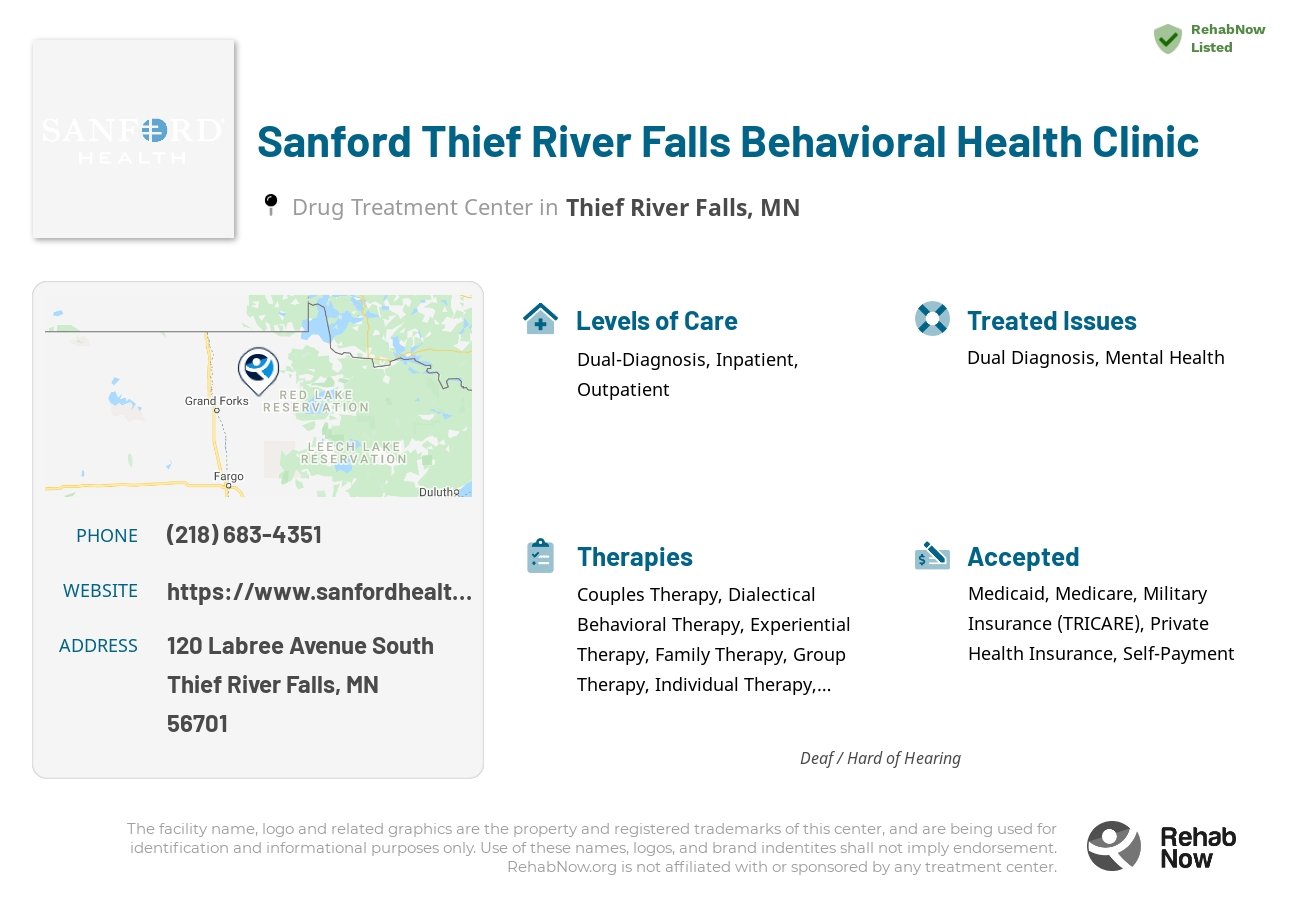Sanford Thief River Falls Behavioral Health Clinic
Drug Rehab Center in Thief River Falls, Minnesota
Sanford Thief River Falls Behavioral Health Clinic in Minnesota offers comprehensive mental health and addiction treatment services, including individual, group, and family therapy, medication-assisted treatment, and specialized programs like trauma recovery therapy and services for members of the armed forces, all backed by accreditations and recognition from reputable organizations.
About This Minnesota Facility
Sanford Thief River Falls Behavioral Health Clinic in Thief River Falls, Minnesota is a behavioral health-focused facility that specializes in providing patients with holistic mental health and addiction treatment services. The clinic offers a wide range of services from primary care and mental health services to residential rehabilitation and outpatient treatment. They strive to provide compassionate and professional support to their patients and their families, utilizing evidence-based practices to ensure quality care.
At Sanford Thief River Falls Behavioral Health Clinic, they provide a variety of different treatment options for individuals who are struggling with addiction and substance abuse. These include individual, group, and family therapy, as well as specialty services such as Dialectical Behavioral Therapy, Cognitive Behavioral Therapy, and Trauma-Informed Treatment. Additionally, they provide medication-assisted treatment, case management, and support services to help individuals navigate their journey to recovery.
In addition to the quality treatment programs, Sanford Thief River Falls Behavioral Health Clinic has been accredited by the Joint Commission, has a dual-license from the Minnesota Department of Human Services and Minnesota Department of Health, and has received recognition from the American Heart Association for its excellence in cardiac care. They offer unique services such as a trauma recovery therapy program, which utilizes evidence-based practices to provide patients with the tools to move forward and heal from the trauma they have experienced. Furthermore, they offer specialized services to members of the Armed forces which include case management, peer support, and referrals to other care centers.
Genders
Ages
Modality
Additional
Conditions and Issues Treated
When addiction and psychiatric issues co-occur, the addict’s recovery is more successful when both conditions are treated. A dual diagnosis refers to a condition in which the patient is diagnosed with two health issues: addiction and bipolar disorder.
Usually, dual diagnosis sufferers are prescribed a combination of treatments for each condition. The most common therapies are psychotherapy, behavioral therapy, spiritual counseling, 12-step programs, and medication management.
Psychiatric conditions are an obstacle to recovery because they can create roadblocks to a healthy lifestyle. Drugs and alcohol may be used as a means of self-medication, which can have dangerous consequences. Over time, addicts build up a tolerance and suffer withdrawal symptoms when drug use is stopped.
With the proper treatment, dual diagnosis sufferers can overcome their conditions and achieve lasting sobriety.
Levels of Care Offered at Sanford Thief River Falls Behavioral Health Clinic
This center offers a variety of custom treatment tailored to individual recovery. Currently available are Dual-Diagnosis, Inpatient, Outpatient, with additional therapies available as listed below.
Inpatient treatment is an option that provides addicts with a supportive environment in which they can stop using. This type of intensive care and supervision is appropriate for those who were unable to quit on their own or need more structure than they could get from outpatient treatment, such as the addict most in need of this level of care.
The goal of inpatient rehab is for the addict to stay focused on sobriety and remain free of mood altering substances. Inpatient treatment programs usually offer the following: detox, therapy groups, one-on-one counseling, medication management and aftercare planning.
Individuals struggling with drug addictions can get help from several treatment options, including inpatient and outpatient programs. Outpatient drug treatment programs can also provide patients with different levels of care, usually depending on the patient’s degree of addiction.
At an outpatient program in Thief River Falls, a patient will attend a recovery program during the day and return home in the evening. Suppose a patient is struggling with drug addiction. In that case, an outpatient program can serve as an effective transition point during the recovery process.
Therapies & Programs
Individual therapy is a critical component of addiction recovery. It allows the patients to go deep into their core issues and discover how to handle those problems better. Therapy can be conducted in individual sessions as well as group settings. In individual therapy for addiction, the patient meets with their therapist one-on-one to focus on the underlying issues. This allows patients to open up and discuss personal topics they may not feel comfortable discussing in a group setting. This type of therapy can help develop solutions specific to each patient, which helps speed up the recovery process.
Couples therapy is beneficial for couples in which at least one partner has a substance use disorder. This type of therapy can help partners improve communication skills, which is an important factor in a healthy relationship. It can also help partners better understand one another so they have a greater understanding of how the other partner may be feeling.
Benefits of couples therapy include:
- Improvement in communication skills
- Increased understanding of the dynamics within a relationship
- Increased sense of support and trust in the relationship
- Better teamwork between partners/increased willingness to listen and work together
- Enhanced tolerance of each other’s shortcomings
- Improved ability to have open, honest communication with each other
Family therapy is a crucial part of drug treatment and getting sober. It is one of the most effective ways to help addicts stay on the path to long-term sobriety. When a drug addict decides that they want to try and get sober, it takes the support of every person they love to succeed. It can be incredibly difficult for loved ones to watch an addict go through the pain and suffering of withdrawal, but by being there with them and supporting them, they can help to make sure that the addiction never returns.
One of the most important parts of family therapy is the relapse prevention plan. During treatment, therapists and doctors will often sit down with the addict and their family to develop a plan in case the addict ever feels like they want to use again. This plan should involve steps the addict and family can take together to prevent them from relapsing in the future. An addict’s family can play a vital part in helping them to avoid relapse because they can spot the warning signs and help them get back on track before it becomes too much of a problem.
Group therapy helps prevent addicts from feeling isolated or unique in their situation by offering a sense of comfort and fellowship. It also creates a forum for addicts to build their support systems and learn from each other. The group therapy sessions at Sanford Thief River Falls Behavioral Health Clinic occur in a group setting rather than one-on-one to create a safer, controlled environment where addicts feel comfortable.
Trauma therapy helps people dealing with addiction by allowing them to confront the traumas of their past and move past them. It is important to note that trauma therapy should not be confused with PTSD (post-traumatic stress disorder) Rather, it is used to treat the effects of trauma, which are often at the root of addiction.
Dialectical Behavior Therapy was developed in the 1980s to treat chronically suicidal individuals. It is a cognitive-behavioral therapy that combines strategies derived from Zen Buddhism, such as mindfulness training. DBT has been adapted for use with other types of psychiatric problems, including substance abuse and personality disorders. DBT aims to help patients change their thinking and behavior, instead of relying on medication.
Cognitive Behavioral Therapy (CBT) is a common therapeutic approach to help drug addicts. It teaches addicts new ways of thinking and behaving so that they can avoid relapse. There are several forms of CBT used in drug rehabilitation centers.
Cognitive Restructuring helps addicts identify faulty, negative thinking so that they can work together with the therapist to find healthier ways of thinking, resulting in better decision-making.
Cognitive Behavioral Therapy for Addiction uses the principles of CBT to help treat addiction. It focuses on specific aspects of each person’s thinking, feeling, physiology, and behavior. It aims to identify specific problems in these areas and create a personalized treatment strategy.
Drug addiction can be a difficult thing to overcome, but with the help of nutrition therapy, it can become a little bit easier. Nutrition therapy provides addicts with the nutrients they need to recover both physically and mentally. This type of therapy also helps addicts to have more energy and strength to fight cravings. Most importantly, good nutrition helps to keep addicts strong against the physical symptoms of withdrawal.
Nicotine replacement therapies are effective because they provide you with the nicotine you are addicted to without inhaling carcinogens from cigarettes. Some types of NRT include nicotine gum, nicotine patches (transdermal systems), nasal spray, and lozenges. The benefits of using NRT can include reducing the risk of heart disease and cancer.
Patient Experience
Experiential Therapy at Sanford Thief River Falls Behavioral Health Clinic
Experiential Therapy is a new approach to addiction treatment. Addiction-related psychological issues like depression and anxiety are addressed through physical activities.
Experiential Therapy can help those who have struggled with past traumas or life decisions like drug use. It allows people to gain new perspectives on their behavior patterns by recreating experiences in healthy ways rather than continuing old habits that may no longer serve them well.
Payment Options Accepted
For specific insurance or payment methods please contact us.
Is your insurance accepted?
Ask an expert, call (888) 674-0062
Sanford Behavioral Health Associated Centers
Discover treatment facilities under the same provider.
- Sanford Hospital - Outpatient Program in Luverne, MN
- Sanford Behavioral Health Headwaters ACT in Bemidji, MN
- Sanford Behavioral Health - Grove Avenue in Bemidji, MN
- Pathfinder Childrens Treatment Center in Thief River Falls, MN
Learn More About Sanford Behavioral Health Centers
Additional Details
Specifics, location, and helpful extra information.
Thief River Falls, Minnesota 56701 Phone Number(218) 683-4351 Meta DetailsUpdated November 25, 2023
Staff Verified
Patient Reviews
There are no reviews yet. Be the first one to write one.
Thief River Falls, Minnesota Addiction Information
Minnesota is fighting an opioid epidemic that is leaving hundreds of its residents dead each year. Both prescription opioids and illicit opioids are widely abused in the Land of 10,000 Lakes. Heroin continues to be one of the most commonly abused drugs in the state, if not the most common illicit drug. Over 10% of all treatment admissions in Minnesota list heroin as their drug of choice.
About 10% of Thief River Falls residents suffer from drug addiction or abuse. Marijuana is the most commonly abused drug in the city, with 24% of arrests for drug-related offenses related to marijuana. Alcohol use is also common, with 33% of residents admitting to binge drinking. Some of the most common types of treatment include inpatient and outpatient facilities, 12-step programs, and support groups.
Treatment in Nearby Cities
- Osseo, MN (245.7 mi.)
- Scandia, MN (254.6 mi.)
- Perham, MN (109.0 mi.)
- Ely, MN (200.1 mi.)
- Alexandria, MN (158.9 mi.)
Centers near Sanford Thief River Falls Behavioral Health Clinic
The facility name, logo and brand are the property and registered trademarks of Sanford Thief River Falls Behavioral Health Clinic, and are being used for identification and informational purposes only. Use of these names, logos and brands shall not imply endorsement. RehabNow.org is not affiliated with or sponsored by Sanford Thief River Falls Behavioral Health Clinic.





